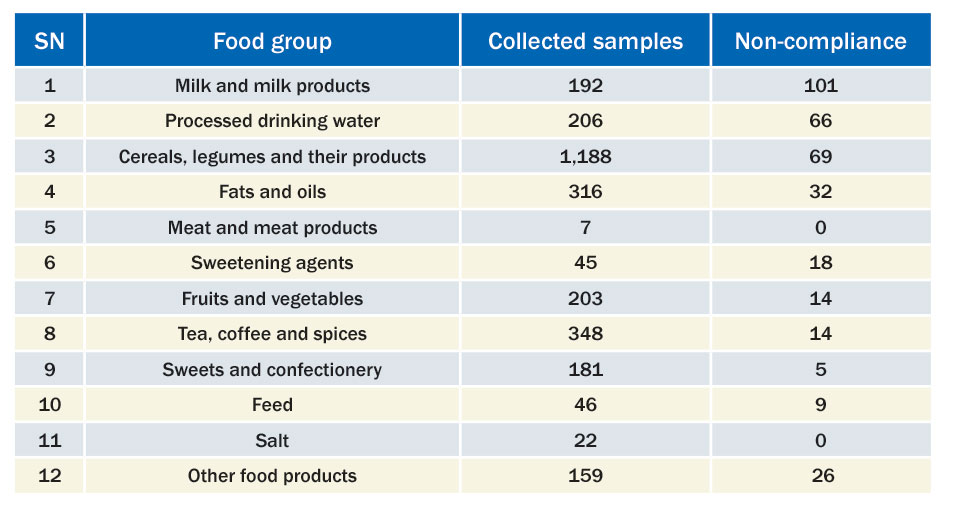
OR
Annual report of Department of Food Technology and Quality Control
Dairy products, processed water top DFTQC's non-compliance list
Published On: January 14, 2019 12:15 PM NPT

KATHMANDU, Jan 14: Milk and milk products have highest rate of non-compliance with quality standards, according to the Department of Food Technology and Quality Control (DFTQC).
A compilation of market inspection activities carried out by the department in Fiscal Year 2017/18 shows that 52.6 percent, or 101 samples, of the 192 samples of milk and milk products collected during the year from 36 districts failed to meet quality standards.
The samples were collected by the department in Kathmandu Valley as well as its divisional offices in Biratnagar, Hetauda, Bhairahawa, Nepalgunj and Dhangadi.
Earlier on June 11, the Ministry of Agriculture and Livestock Development conducted surprise inspections of different dairy producers, including the state-owned Dairy Development Corporation (DDC), in Kathmandu Valley. Lab test of samples collected during the inspection confirmed presence of coliform in 33 out of 36 samples.
As findings of the lab tests was covered with great prominence by leading media outlets, it had caused demand for milk and dairy products to fall across the country, say food technicians. Talking to Republica, Narayan Prasad Devkota, chairman of Central Dairy Co-operative Association Ltd, Nepal (CDCAN) said that daily demand for milk had come down by as much as 80,000 liters following the surprise inspection of dairy producers by the ministry.
The country produces around 4.9 million liters of milk every day. Around 700,000 liters of the total production is estimated to be consumed by general people after it is processed by dairy producers.
Likewise, processed drinking water comes second on the list in terms of non-compliance with quality standards. Of the 206 samples of processed drinking water collected by the department from six districts, 66 were found to be substandard. Next on the list is cereals, legumes and their products. According to the department 69 of the collected 1,188 samples were found to be substandard.
Market inspectors had collected samples from food markets, supermarkets, groceries and food/feed industries, among others.
"Altogether 2,813 food samples were collected during inspection from 36 districts. Of the total samples, 12.58 percent failed to meet the prescribed quality standards prescribed by the department," the report states.
The department and its offices had filed 224 cases against producers of substandard food products. Of them, 49 cases are against producers/sellers of cereals, legumes and their products, while 43 are against producers of fats and oils. Meanwhile, 41 cases have been filed against producers of processed drinking water, 32 against dairy producers, 12 against sweets and confectioneries producers, and 12 against tea, coffee and spices producers/sellers. Similarly, four cases have been filed against fruits and vegetable sellers and nine against animal feed producers.
The department had filed 263 cases against firms, whose products failed to meet its quality standards, in FY2016/17.
You May Like This

Mysterious disease killing dogs in Norway
HELSINKI, Sept 8: Norwegian authorities haven’t been able to detect the cause behind an unexplained disease that is estimated to... Read More...

Complete education, full health could double Nepal's GDP per capita: WB
KATHMANDU, June 7: Nepal has the potential to double its Gross Domestic Product (GDP) per capita in the long run if... Read More...

Smugglers’ go-downs near customs office
SIRAHA, March 16: On March 10, a team from the District Police Office (DPO), Siraha, arrested a truck with an... Read More...





Just In
- CM Kandel requests Finance Minister Pun to put Karnali province in priority in upcoming budget
- Australia reduces TR visa age limit and duration as it implements stricter regulations for foreign students
- Govt aims to surpass Rs 10 trillion GDP mark in next five years
- Govt appoints 77 Liaison Officers for mountain climbing management for spring season
- EC decides to permit public vehicles to operate freely on day of by-election
- Fugitive arrested after 26 years
- Indian Potash Ltd secures contract to bring 30,000 tons of urea within 107 days
- CAN adds four players to squad for T20 series against West Indies 'A'













Leave A Comment